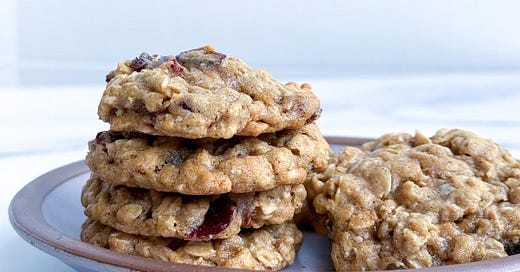Hi Friends,
In our latest episode, Anna and I get into a topic that brings up a lot of emotions for parents: How to navigate sweets with kids?
We talk about into:
Why sugar has been demonized in our culture.
Diet culture and beliefs about sugar and “good parenting.”
What sugar is and why our bodies need it.
Myths about sugar.
The link between restriction and kids’ interest in sweets.
Realistic advice on how to create structure around sweets.
How we talk about sweets matters.
Anna and I also share personal examples from our own homes — plus our favorite sweets right now!
Mentioned in this episode:
Let’s Talk About Sugar(blog post)
We’d love to hear from you!
Have a question about sweets or a myth you want us to bust?
You can listen to the Sunny Side Up Nutrition Podcast on
Substack, Apple Podcasts, Spotify, or wherever you get your podcasts.
Podcast Transcript
Elizabeth:
Hi, Anna. It's great to see you.
Anna:
Hi, Elizabeth. I'm so excited to see you and talk about this topic.
Elizabeth:
Yeah! Today we’re diving into a topic that brings up a lot of feelings for parents: sugar.
We often get questions like:
Should I limit sweets?
How do I navigate sweets in my house?
What do I do if my kids are asking for dessert all the time?
If that’s you—you’re not alone. Let’s jump in and chat about sweets and how to navigate them.
Anna:
Great! Sounds good to me.
Elizabeth: So why do you think sugar has become such a villain, especially when it comes to parenting and feeding kids?
Anna:
I think as a society, we like to put things into categories—good or bad—and the nuance gets lost. That’s gotten even more heightened with social media and how we consume information.
It’s easier to say, “These foods have lots of nutrition” and “These foods don’t, so they must be bad.” But the truth is, food is way more complicated.
Putting foods in these categories isn’t scientifically accurate, and it doesn’t reflect how we feel about food, who we eat with, our culture—there’s so much more to health than just nutrients.
Elizabeth::
I couldn’t agree more. Social media really impacts how people think about food. Quick soundbites don’t leave room for nuance, and people click on sensational posts, not on ones that say, “Well, it’s complicated…”
Anna:
Exactly.
Elizabeth:
How would you say diet culture has shaped our beliefs about sugar and what it means to be a “good parent”?
Anna:
Diet culture touches every part of our society—including parenting. There’s this idea that to be a “good parent” your child should eat certain foods, not eat others, and be a certain size.
But what I’d love the message to be is: as parents, we can strive to help our kids eat all kinds of foods, enjoy celebrations, and navigate different situations.
Elizabeth:
Yes! It’s sad that it’s become so black and white when food is wonderful and fun—and sweets taste awesome. Sugar is necessary! Let’s talk about what sugar really is from a nutrition science perspective.
Anna:
Great. We have a blog post on the science of sugar we can link to!
There are three macronutrients: carbohydrates, protein, and fat. Sugar is a type of carbohydrate. Our brains and muscles run on glucose, which comes from carbohydrates.
When people talk about sugar, they usually mean simple carbohydrates—1 or 2 glucose molecules linked together. These digest faster than complex carbohydrates (starches), which are lots of glucose molecules linked together.
Elizabeth:
Exactly. Simple carbs give quick energy—which we need! And at the end of the day, all carbs break down into glucose.
Elizabeth:
What’s a myth you hear most often?
Anna:
That sugar makes kids hyper. The research doesn’t support that!
Kids might get quick energy from sugar alone, but it doesn’t cause hyperactivity. Often it’s the excitement of the setting—like a party—that’s at play.
Elizabeth:
Right. And when sugar is eaten with protein or fat—like in cake or ice cream—it digests more slowly.
Anna:
Another myth is that sugar has no nutritional value.
Elizabeth:
Yes! Sugar gives us energy. And it’s usually in foods that contain other nutrients, like fruit (fiber, vitamins, minerals). Let’s touch on sugar “addiction.”
Anna:
We need food to survive. We don’t say people are addicted to oxygen, right?
When people restrict sugar, it tastes especially good when they finally have it. That’s our body’s survival mechanism.
Anna:
Yes. And brain scans showing activity when we eat sugar just show that food is rewarding—which it has to be, because we need it!
Elizabeth:
Let’s talk about restriction and how it increases kids’ interest in sweets.
Anna:
Restriction can mean not allowing sweets in the house or even commenting negatively when they’re eaten. Psychological restriction counts too—like, “You can’t have dessert until you eat your broccoli.”
And even things like putting just two tiny candies in a lunchbox can be a form of restriction that sends a message of scarcity.
Elizabeth:
Exactly. We know from research that restriction makes kids want those foods more, and they may eat past fullness when they do get access.
Anna:
Right. Instead, we can offer sweets in a structured way. For example:
A small sweet in lunches
A sweet after dinner most nights
Occasionally offering sweets as a snack and letting kids eat until they’re full
The key is to help sweets be just one part of what they eat—not the forbidden prize.
Elizabeth:
Why do we avoid demonizing language about sugar?
Anna:
It confuses kids: If this is so bad, why does my parent give it to me?
It also can create shame. Kids think, I like this—am I bad for liking it?
Elizabeth:
If a parent’s child is constantly asking for sweets, what’s one thing they could try today?
Anna:
Offer sweets proactively—before your child asks. Maybe serve a small dessert with dinner. It helps shift away from the battle and reassures your child that sweets are available.
Elizabeth:
And let your kids see you enjoying sweets too. That modeling matters!
So before we wrap up: what’s your favorite sweet right now?
Anna:
Chocolate-covered cherries from Trader Joe’s—and I recently discovered seven-layer bars at Whole Foods! I also love baking pies in summer.
Elizabeth:
Ice cream—especially Tillamook Malted Moo.
If you’d like to dive deeper into this topic and join a community focused on raising kids with a healthy relationship with food, check out our Sunny Side Up membership.
Thanks for listening!
Resources Mentioned:
Let’s Talk About Sugar(blog post)













Share this post